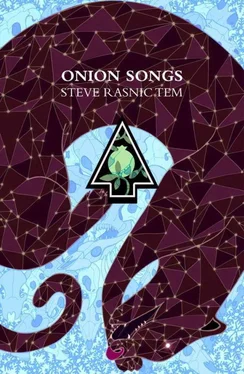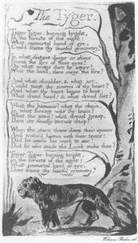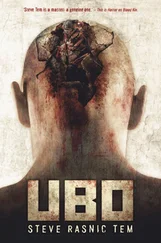Strange, adj. Foreign, the quality of being alien, not native.
She was somewhat surprised. Was that what the word really meant? She had expected some description of unease. Disquiet. Now that was a good word. Disquiet was the way she felt most of the time, in her house, in her life, in the marriage. Disquietude would be the noun. The place where she lived now.
Not native. That felt absolutely correct. Suddenly, unexpectedly, she had discovered she was not native to this place. The lands at the periphery of her vision, the island out the corner of the eye—that’s where she had come from.
The twenty-somethings were now in a bar somewhere. The camera work was jarring and aggressive, the colors bright, violent. Something about to happen, although she saw nothing evident on the screen. But she did not look away.
Once she’d arrived at the correct place, Trish had felt compelled to read the remainder of that dictionary page. It was like a rest stop on a long trip. Since you were already there, why not visit “the world’s largest prairie dog hole?”
Strange woman , apparently, was an archaic term for a prostitute. There were other meanings, of course. But did they all have some sort of sexual association buried in their etymologies? Weird sisters and harpies and sphinxes. Strangeness back to the beginnings of art and writing. Angie, who believed in astrology and evil spirits and the living Christ, and all manner of things Trish considered strange, said that it was men who made up the words and men who compiled the dictionaries, so it should be no wonder that women were associated with things strange and vaguely sinister.
She became aware of an insistent susurration in the room. She glanced over at Martin, whose breath whistled, as if he had fallen asleep with his eyes open. He fell asleep often these days: in front of his computer, sitting out on the porch. And this despite the fact that he was always in bed before she was. He used to complain about the resulting neck pain in the morning, although now he did not complain about anything, ever.
She did not think he was asleep. She could see his eyes flickering, his tongue darting between his lips. But he continued making that noise. As if he were having difficulty breathing. As if he were in pain.
Susurration. Like snakes gathered together to exchange the secrets of the world. Trish hadn’t realized that she even knew the word.
* * *
Martin sat motionless at the dinner table, his eyes two wet gray pebbles floating on yellowing jelly. Late afternoon spring sun afforded a relatively clear glimpse. He’d requested these earlier dinners, and eager to please him (did she imagine this would magically fix things?) she’d obliged. It hadn’t resulted in additional time together, however. He just had more time in the evenings to ruminate, to vegetate, to do exactly what, it now seemed, he did best: to stare unblinking at a life she wasn’t sure she understood anymore. They used to walk in the park, garden, sit in the sun, together, but not anymore. Martin was either too tired or too busy, but she honestly couldn’t figure out what he was being busy at.
His skin had a grayish, raw dough patina. The tiny cracks at the corners of his eyes appeared to have multiplied since the last time she’d noticed. She wasn’t sure, but his hair appeared to be visibly thinner. It was certainly grayer. There was also a puffiness about him, as if air was trapped in hidden pockets beneath the skin.
So people age. Headline news. She chided herself. If he wanted he could no doubt catalog a dozen similar changes in her face. But did he notice her enough to do so? He was still a handsome man—she needed to appreciate more what she had and not, as her grandmother used to say, “borrow trouble.”
“So,” she ventured. “You haven’t said anything about the ham.”
His eyes rolled towards her from somewhere behind his lids. “This isn’t ham.”
“Well, no. It’s what we always have. Turkey ham. It’s healthier.”
“It’s also pinker. Real ham doesn’t come this pink. I don’t believe so, at least. We haven’t had real ham in a very long time, I don’t believe.”
“If you want real ham, Martin, I’d be happy to fix you some real ham.”
“No, no. You said this is healthier.”
“Then what are you trying to say?”
“I’m not trying to say anything. I’m just saying that you asked me about the ham, but this isn’t ham. It’s turkey ham. But it’s perfectly fine for us to eat. It tastes just fine.”
A few years ago she would have been offended by the conversation. He was so hard to please. Now it seemed more likely that he was too easy to please, or that “pleased” hadn’t much meaning for him.
The remainder of their dinner conversation consisted of factual statements about the weather, the progress of the neighbor’s new patio, and a repeated recollection of Molly’s phone call from four days ago. She was pregnant, due in six or seven months. She lived across the country and they rarely saw her. They’d met her husband once, last Christmas. Martin had commented that the young man appeared to be stable, but that he needed a better haircut. She’d agreed. She’d actually said, “I agree,” even though she thought it was a ridiculous thing for him to say. It was the only comment he’d ever made about their son-in-law.
Later that evening Trish peered into the study where Martin was reading. She watched surreptitiously as he periodically turned the pages, tears tracing his cheeks with almost parallel trails. She left quickly so that he wouldn’t see her watching him.
Downstairs she cleaned the kitchen, although it was already spotless. She looked around for laundry to do. Towels were stacked neatly on shelves in the laundry room, sheets were in cabinets, and every bit of clothing except what they had on was tucked away cleaned and pressed in a drawer somewhere. Her rising anxiety was assuaged only when she took off all her clothes and slipped into a fresh clean robe, dropping the clothes into the washer and starting it. She would have just enough time to iron the small load before joining Martin in bed.
She went back upstairs. Martin was no longer in his study. She found him in their bedroom, lying in bed in his bright blue pajamas, sheet tucked tightly across his heart, staring at the ceiling. His lips moved slightly, constantly. She found the indecipherable whisper mildly irritating so she left.
* * *
“I’m just afraid there’s something really wrong with him that he needs to be treated for.”
Angie patted her arm with one hand and waved a cigarette sympathetically with the other. “Oh, I know, hon. You couldn’t drag my first husband into the doctor’s until the cancer ate his throat.” Then, when Trish started crying, “Oh… sorry.”
“He doesn’t want to tell me what’s bothering him. Half the time I’m not sure he even knows I’m there.”
Angie’s two-year-old—Trish couldn’t remember the little boy’s name—planted himself in front of her with his thumb in his mouth. Angie put the cigarette down and moved him like an errant piece of furniture. “Maybe he can’t help it,” she said. “There may be other forces involved.”
Trish looked up warily. “You mean another woman.” She almost said “A strange woman.”
“I mean the devil takes on a number of different roles in our lives. And when you’re wrestling with the devil, pretty much everyone else disappears, including your family. I know you may not believe that, but it’s what I believe.”
Harry was sitting at his own table, a small square of wood not much bigger than a dinner plate, in a corner against the wall by the sink. He’d turned his chair around to face them, but Angie’s wide shoulders hid most of his body. He’d been smiling since Trish arrived, his eyes floating as if he were listening to his own private, ecstatic tune.
Читать дальше












